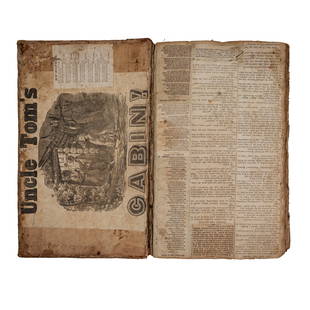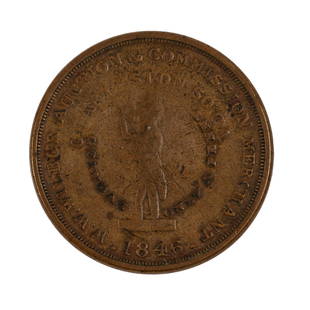
ULYSSES S. GRANT 1876 Pardon Signed as President
Similar Sale History
View More Items in Books, Magazines & Papers



Related Books, Magazines & Papers
More Items in Books, Magazines & Papers
View MoreRecommended Collectibles
View More




Item Details
Description
Autographs
1876 President "U.S. Grant" Signed Official Pardon Warrant
ULYSSES S. GRANT (1822-1885). 18th U.S. President from 1869 to 1877. During the American Civil War Grant led the Union Army as its Commanding General to victory over the Confederacy in the last years of the Civil War with the supervision of President Abraham Lincoln; First Lieutenant-General since George Washington.
April 25th, 1876-Dated, Partially-Printed Official Document Signed, "U.S. Grant" as President, 1 page, Choice Crisp Extremely Fine. Boldly printed in deep black script and Completed in Manuscript, measuring 7.75" x 10", President Grant signs "a Warrant for the pardon of John W. Sessoms." Special wove period paper and script in excellent condition with two standard folds for mailing. The last example of a similar Pardon Warrant was in our EAHA Auction of April 28, 2015, lot 34 in similar quality, where it sold for $1,560. Superb clear large vivid deep dark brown ink signature "U.S. Grant" measuring 2.5" long appears crisp with a flourish, making this Document excellent for display.
Ulysses S. Grant (born Hiram Ulysses Grant) (April 27, 1822 " July 23, 1885) was an American soldier, politician, and international statesman, who served as the 18th President of the United States from 1869 to 1877.
During the American Civil War Grant led the Union Army as its commanding general to victory over the Confederacy with the supervision of President Abraham Lincoln. During the Reconstruction Era, President Grant led the Republicans in their efforts to remove the vestiges of Confederate nationalism, racism, and slavery.
From early childhood in Ohio, Grant was a skilled equestrian who had a talent for taming horses. He graduated from West Point in 1843 and served with distinction in the Mexican"American War. Upon his return, Grant married Julia Dent, and together they had four children. In 1854, Grant abruptly resigned from the army. He and his family struggled financially in civilian life for seven years.
When the Civil War broke out in 1861, Grant joined the Union Army and rapidly rose in rank to general. Grant was persistent in his pursuit of the Confederate enemy, winning major battles and gaining Union control of the Mississippi River. In March 1864, President Abraham Lincoln promoted Grant to Lieutenant General, a rank previously reserved for George Washington. For over a year Grant's Army of the Potomac fought the Army of Northern Virginia led by Robert E. Lee in the Overland Campaign and at Petersburg. On April 9, 1865, Lee surrendered to Grant at Appomattox, and the war ended.
On April 14, 1865, Lincoln was assassinated. Grant continued his service under Lincoln's successor President Andrew Johnson and was promoted General of the Army in 1866. Disillusioned by Johnson's conservative approach to Reconstruction, Grant drifted toward the "Radical" Republicans.
Elected the youngest 19th Century President in 1868, Grant stabilized the post-war national economy, created the Department of Justice, and prosecuted the Ku Klux Klan. He appointed African-Americans and Jewish-Americans to prominent federal offices. In 1871, Grant created the first Civil Service Commission.
The Democrats and Liberal Republicans united behind Grant's opponent in the presidential election of 1872, but Grant was handily re-elected. Grant's new Peace Policy for Native Americans had both successes and failures. Grant's administration successfully resolved the Alabama claims and the Virginius Affair, but Congress rejected his Dominican annexation initiative. Grant's presidency was plagued by numerous public scandals, while the Panic of 1873 plunged the nation into a severe economic depression.
After Grant left office in March 1877, he embarked on a two-and-a-half-year world tour that captured favorable global attention for him and the United States. In 1880, Grant was unsuccessful in obtaining the Republican presidential nomination for a third term. In the final year of his life, facing severe investment reversals and dying of throat cancer, he wrote his memoirs, which proved to be a major critical and financial success. At the time of his death, he was memorialized as a symbol of national unity.
Historical assessments of Grant's legacy have varied considerably over the years. Historians have hailed Grant's military genius, and his strategies are featured in military history textbooks. Stigmatized by multiple scandals, Grant's presidency has traditionally been ranked among the worst. Modern scholars have shown greater appreciation for his achievements that included civil rights enforcement and has raised his historical reputation. Grant has been regarded as an embattled president who performed a difficult job during Reconstruction.
1876 President "U.S. Grant" Signed Official Pardon Warrant
ULYSSES S. GRANT (1822-1885). 18th U.S. President from 1869 to 1877. During the American Civil War Grant led the Union Army as its Commanding General to victory over the Confederacy in the last years of the Civil War with the supervision of President Abraham Lincoln; First Lieutenant-General since George Washington.
April 25th, 1876-Dated, Partially-Printed Official Document Signed, "U.S. Grant" as President, 1 page, Choice Crisp Extremely Fine. Boldly printed in deep black script and Completed in Manuscript, measuring 7.75" x 10", President Grant signs "a Warrant for the pardon of John W. Sessoms." Special wove period paper and script in excellent condition with two standard folds for mailing. The last example of a similar Pardon Warrant was in our EAHA Auction of April 28, 2015, lot 34 in similar quality, where it sold for $1,560. Superb clear large vivid deep dark brown ink signature "U.S. Grant" measuring 2.5" long appears crisp with a flourish, making this Document excellent for display.
Ulysses S. Grant (born Hiram Ulysses Grant) (April 27, 1822 " July 23, 1885) was an American soldier, politician, and international statesman, who served as the 18th President of the United States from 1869 to 1877.
During the American Civil War Grant led the Union Army as its commanding general to victory over the Confederacy with the supervision of President Abraham Lincoln. During the Reconstruction Era, President Grant led the Republicans in their efforts to remove the vestiges of Confederate nationalism, racism, and slavery.
From early childhood in Ohio, Grant was a skilled equestrian who had a talent for taming horses. He graduated from West Point in 1843 and served with distinction in the Mexican"American War. Upon his return, Grant married Julia Dent, and together they had four children. In 1854, Grant abruptly resigned from the army. He and his family struggled financially in civilian life for seven years.
When the Civil War broke out in 1861, Grant joined the Union Army and rapidly rose in rank to general. Grant was persistent in his pursuit of the Confederate enemy, winning major battles and gaining Union control of the Mississippi River. In March 1864, President Abraham Lincoln promoted Grant to Lieutenant General, a rank previously reserved for George Washington. For over a year Grant's Army of the Potomac fought the Army of Northern Virginia led by Robert E. Lee in the Overland Campaign and at Petersburg. On April 9, 1865, Lee surrendered to Grant at Appomattox, and the war ended.
On April 14, 1865, Lincoln was assassinated. Grant continued his service under Lincoln's successor President Andrew Johnson and was promoted General of the Army in 1866. Disillusioned by Johnson's conservative approach to Reconstruction, Grant drifted toward the "Radical" Republicans.
Elected the youngest 19th Century President in 1868, Grant stabilized the post-war national economy, created the Department of Justice, and prosecuted the Ku Klux Klan. He appointed African-Americans and Jewish-Americans to prominent federal offices. In 1871, Grant created the first Civil Service Commission.
The Democrats and Liberal Republicans united behind Grant's opponent in the presidential election of 1872, but Grant was handily re-elected. Grant's new Peace Policy for Native Americans had both successes and failures. Grant's administration successfully resolved the Alabama claims and the Virginius Affair, but Congress rejected his Dominican annexation initiative. Grant's presidency was plagued by numerous public scandals, while the Panic of 1873 plunged the nation into a severe economic depression.
After Grant left office in March 1877, he embarked on a two-and-a-half-year world tour that captured favorable global attention for him and the United States. In 1880, Grant was unsuccessful in obtaining the Republican presidential nomination for a third term. In the final year of his life, facing severe investment reversals and dying of throat cancer, he wrote his memoirs, which proved to be a major critical and financial success. At the time of his death, he was memorialized as a symbol of national unity.
Historical assessments of Grant's legacy have varied considerably over the years. Historians have hailed Grant's military genius, and his strategies are featured in military history textbooks. Stigmatized by multiple scandals, Grant's presidency has traditionally been ranked among the worst. Modern scholars have shown greater appreciation for his achievements that included civil rights enforcement and has raised his historical reputation. Grant has been regarded as an embattled president who performed a difficult job during Reconstruction.
Buyer's Premium
- 25%
ULYSSES S. GRANT 1876 Pardon Signed as President
Estimate $1,200 - $1,600
Shipping & Pickup Options
Item located in Rancho Santa Fe, CA, usSee Policy for Shipping
Payment

Related Searches
TOP
































![[SHEET MUSIC]. Group of 10 Ulysses Grant and Related Sheet ...: [SHEET MUSIC]. Group of 10 Ulysses Grant and Related Sheet Music. [V.p., ca. 1860s-1900s]. 4tos. Original wrappers. All with black and white images on front wrappers. Sizes approximately 13 x 10 ½](https://p1.liveauctioneers.com/928/328184/176813698_1_x.jpg?height=310&quality=70&version=1714496988)
![[SHEET MUSIC]. Group of 6 Ulysses Grant and Related Sheet M...: [SHEET MUSIC]. Group of 6 Ulysses Grant and Related Sheet Music. [V.p., ca. 1860s-1920s]. 4tos. Original wrappers. Three with black and white lithographed portraits of Grant on the front wrappers. Siz](https://p1.liveauctioneers.com/928/328184/176813699_1_x.jpg?height=310&quality=70&version=1714496988)







































![[Ambrotype] Texas Confederate Soldier: Sixth plate ambrotype. Full leatherette case. Portrait of a possible Texas Confederate soldier. A silver star device was used to pin up the brim of his light-toned headgear, a look often seen in image](https://p1.liveauctioneers.com/7226/322253/173251509_1_x.jpg?height=310&quality=70&version=1710004847)


![Captured Bowie Knife w/ Period Note of Provenance: Captured Confederate D-hilt Bowie knife. [Kenansville, North Carolina]: [Louis Froelich factory]. With original metal and leather sheath with affixed period notes. First note with only remnants. Secon](https://p1.liveauctioneers.com/7226/325455/175169154_1_x.jpg?height=310&quality=70&version=1712370394)

![[Civil War] Bullet Which Nearly Killed Soldier: Lead bullet encased in gold acorn fob with chain. Finely engraved: "W.D. Fiske / 14th Regt. C V / Fredericksburg / Dec 17, 1863." Acorn approx. 1 1/2 x 1 in. Overall length 6 1/2 in. Published in "Her](https://p1.liveauctioneers.com/7226/325455/175169103_1_x.jpg?height=310&quality=70&version=1712370394)